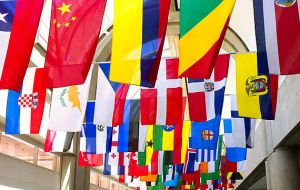MercoPress. South Atlantic News Agency
Human Freedom Index: Chile, Costa Rica lead in Latin America
 On a scale of 0 to 10, where 10 represents more freedom, the non-weighted average rating for 159 countries in 2014 was 6.93.
On a scale of 0 to 10, where 10 represents more freedom, the non-weighted average rating for 159 countries in 2014 was 6.93.  The top 10 jurisdictions were Hong Kong, Switzerland, New Zealand, Ireland, Denmark, Australia (6), Canada (6), the UK(6), Finland (9), and Netherlands (10).
The top 10 jurisdictions were Hong Kong, Switzerland, New Zealand, Ireland, Denmark, Australia (6), Canada (6), the UK(6), Finland (9), and Netherlands (10).  US is ranked in 23rd place. Other countries rank as follows: Germany (13), Chile (29), France (31), Japan (32), Singapore (40), South Africa (74) and Brazil (82)
US is ranked in 23rd place. Other countries rank as follows: Germany (13), Chile (29), France (31), Japan (32), Singapore (40), South Africa (74) and Brazil (82) The Human Freedom Index 2016, (HFI), was released on Monday, the second annual report that represents the state of overall freedom in the world based on a broad measure of personal, civil and economic freedom. Co-published by the Cato Institute, the Fraser Institute (Canada) and the Liberales Institut (Germany) from the Friedrich Naumann Foundation, it looks into 179 distinct indicators in 159 countries on issues ranging from freedom of speech and association to women’s freedoms, the extent of voluntary exchange, safety and security, the rule of law and more.
The HFI is the most comprehensive freedom index so far created for a globally meaningful set of countries. The HFI covers 159 countries for 2014, the most recent year for which sufficient data are available. The index ranks countries beginning in 2008, the earliest year for which a robust enough index could be produced.
On a scale of 0 to 10, where 10 represents more freedom, the non-weighted average rating for 159 countries in 2014 was 6.93. The level of global freedom stayed about the same compared to 2008, but almost all countries experienced changes in their ratings, with about half of those increasing their ratings and half decreasing.
The top 10 jurisdictions in order were Hong Kong, Switzerland, New Zealand, Ireland, Denmark, Australia (6), Canada (6), the United Kingdom (6), Finland (9), and the Netherlands (10). The United States is ranked in 23rd place. Other countries rank as follows: Germany (13), Chile (29), France (31), Japan (32), Singapore (40), South Africa (74), Brazil (82), India (87), Russia (115), Nigeria (140), China (141), Saudi Arabia (144), Zimbabwe (148), Venezuela (154), and Iran (157).
In Latin America Chile is followed by Costa Rica, Uruguay, Panama, Peru, Suriname, El Salvador, Guatemala, Bolivia, Nicaragua, Mexico, Paraguay, Brazil, Ecuador, Honduras, Argentina, Colombia, Guyana and Venezuela.
Out of 17 regions, the highest levels of freedom are in Western Europe, Northern Europe, and North America (Canada and the United States). The lowest levels are in the Middle East and North Africa, South Asia, and sub-Saharan Africa. Women’s freedoms, as measured by seven relevant indicators in the index, are strongest or least repressed in Europe and North America and least protected in the Middle East and North Africa, South Asia, and sub-Saharan Africa.
Countries in the top quartile of freedom enjoy a significantly higher per capita income (US$37,147) than those in other quartiles; the per capita income in the least-free quartile is US$8,700. The HFI finds a strong correlation between human freedom and democracy.
The findings in the HFI suggest that freedom plays an important role in human well-being, and they offer opportunities for further research into the complex ways in which freedom influences, and can be influenced by, political regimes, economic development, and the whole range of indicators of human well-being.




Top Comments
Disclaimer & comment rules-

-

-

Read all comments@ Fidel_CasTroll
Dec 06th, 2016 - 10:38 pm +2Do you have an actual reason for saying the CATO institute hates Argentina, or is it just your usual persecution complex?
Poor Argentina, must be down to
Dec 06th, 2016 - 01:27 pm +1Human--error, and definatly not
Right...
It's fun to listen to conversations between argies concerning Chile, which they claim is so backward and Third-World that they don't even manufacture their own screws. In the next discussion someone will mention that the electronics assembly in Ushuaia sometimes only includes Argentine-made screws in the mix of otherwise all foreign sourced components but that is enough to get the label “Made in Argentina.” Under enormous subsidies of course, that make Argentine tax rates the highest in the region, and result in excessively high costs for consumer products. Gotta keep those unskilled people busy somehow.
Dec 06th, 2016 - 03:14 pm +1This “2016” report is a bit misleading. It's based on 2014 data, which means that Argentina gets rated by failed Kirchnerism policies like the severe restrictions on printed materials from outside the country. But even so, it's rather unsurprising to see Kirchnerist Argentina rated right between Mozambique and Malawi, but still worse than Uganda and Rwanda. It's also interesting to note the decline in Human Freedom Index for Argentina during the Kirchner years. It looks like it went from an almost acceptable 58th place in 2008 to a miserable 103 for the latest data. Between 2008 and 2014, Kirchnerist Argentina fell from a Human Freedom Index rating of 7.21 to a significantly worse 6.52, below even Botswana and Liberia.
Commenting for this story is now closed.
If you have a Facebook account, become a fan and comment on our Facebook Page!